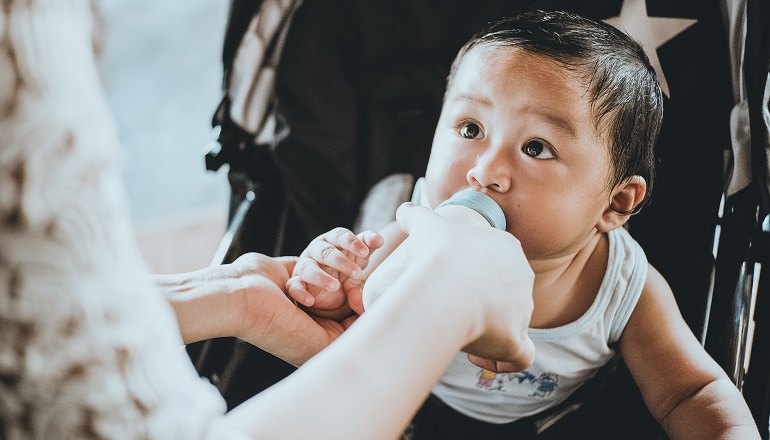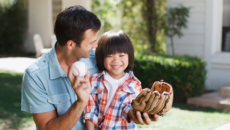Recently, I was racing to get somewhere with my two-year-old son, pushing his stroller at lightning speed through the streets. We came upon a group of pre-teen girls, and, not able to push past them, I eavesdropped on their animated conversation. “I got my long legs from my dad. He’s really tall,” one said. “So’s mine,” another replied, “but I definitely got my wavy hair from my mom’s side.” The conversation continued along these lines, and as the girls delighted in noting the family traits their parents genes had bestowed upon them, I couldn’t help but think of my son. Five, 10, 15 years down the line, how would he contribute to a conversation like this? How would it make him feel?
When my son was younger, I used to hear this kind of thing all the time at the playground. New parents love to make comparisons. Once you get past the obligatory discussions about ages and milestones reached, the small talk invariably turns to genetics: “She looks just like her older sister.” “He has the Smith family sense of humor.” “She’s blond, like her dad, but has dimples, just like me.” From the moment a baby is born, relatives judge whether the child looks more like mommy or daddy. It’s natural to want to find sameness in others, but the search for sameness could leave the adopted child out of the conversation.
Standing Up to Family
And what happens when the comparisons hit even closer to home? Say, from a family member? Mary Birks, whose children, Maddy, five, and Jack, four, were both adopted domestically, hears comments about inherited traits all the time. Certain family members will say, “The family is so fair,” or, “All the kids are cute little tow-heads.” It’s something I’ve heard my whole life, but have become sensitized to after adopting.
Genetic comparisons will be a fact of life for most adoptees. Whether relatives bring up the topic or they have questions themselves, adoptees have to make sense of their place in their family. “I do worry,” Birks says, “that the kids, upon hearing enough of those comments—even when they’re not meant to be hurtful—begin to think fair is the best thing to be.”
[Instant eBook: The Complete Guide to Talking About Adoption]
Talk about sameness comes up mostly in a setting where several family members are together. Reagan Baker, whose 15-month-old son, Cameron, is from Korea, is well aware of this dynamic. “My cousin has a child by birth who’s the same age as my son. Our family members will say to my cousin’s son, ‘You have blue eyes, just like your father, and cheeks like your mother had when she was a baby.’ I usually chime in that he sure does, and then turn to my son and say something like, ‘We know Cameron will be a golfer, just like his daddy, because he carries his golf clubs from room to room.’ We feel that the words we use will set an example for other family members and will help build our child’s self-confidence.”
“Baker’s response is on target,” says Ronny Diamond, Director of the Adoption Consultation Team at Spence-Chapin, an adoption agency in New York City. “There are lots of ways that people in families resemble each other. And what’s so good about everybody looking the same?” she adds. “Some children enjoy feeling unique and special, while others don’t want to stand out at all.”
Most resemblance comments are innocuous. But sometimes, remarks that point out how a child is unlike his family don’t easily roll off the back. Paula Riley, whose four-year-old son was adopted from Russia, says she often hears relatives say that her son might not be basketball-player material like the rest of the family, since he lacks the height and weight. “My mother makes comments about how she hopes that my son will be good at soccer or baseball, because he doesn’t have the height for basketball like the rest of our family.”
So how does Riley tackle the issue? “I confront these comments with my family head-on. My husband and I don’t consider height an issue, and neither should they. Everyone is different, and they are all beautiful in their own ways.”
Setting an Example
Dr. Joyce Maguire Pavao, CEO and Founder of the Center for Family Connections, suggests we use such instances as teachable moments. “Even if their child is still too young to understand the questions, parents worry about what it will be like when he is old enough to realize that they don’t know how tall his birth parents are, and so on. Give relatives a bit of consciousness-raising. Most people just don’t think,” she says.
And although you can’t prevent people from making genetic comparisons, you can gently suggest to extended family members that, though your niece may be the spitting image of her older sister, constantly emphasizing that fact could impact an adopted child.
Talk to older children in a private conversation, when it’s just the two of you. Dr. Maguire Pavao suggests asking how your child feels when people bring up resemblances, and letting him know how such questions make you feel. “Say that it makes you wonder what his or her birth mom or birth dad looked like—they must have been beautiful and must have had the same eyes,” she says.
“Discussions about what we share—how we’re alike and how we’re different,” adds Spence-Chapins Diamond, “can be wonderful lead-ins to nature versus nurture with kids.” “While any parent’s goal is to safeguard their children from rudeness, questions that remind your child of his or her origins are inevitable,” says Mary Mason, an adoption specialist who is both an adoptee and an adoptive mom. “It’s best not to try to avoid them.”
[“I Can’t Believe She Just Said That!” – Biggest Adoption Misconceptions]
Celebrating Differences
“The healthiest adoptive family acknowledges differences,” Mason adds. “Parents can explain that, in certain ways, we’re the same and in other ways, we’re different—and emphasize that the similarities and differences are both wonderful.”
Birks, whose children are constantly compared to the fairer folk in her family, tries to arm them with confidence and pride in their own particular traits. “We talk about how lucky we are that we all have our own special look, and we discuss what’s good about each. Maddy has the best blond hair in the family, for example, and the bluest eyes, and Jack has the best dark brown hair with curls. Then we concentrate on what we like to do together, even though we’re different. We all like to read books, spend time outside, play games, go on vacation.” Hearing from a parent what traits they like best, or what similarities they share, helps a child gain confidence about what’s different and get excited about who he is.
“One of the best gifts you can give your child is self-acceptance.” Says Dr. Maguire Pavao, “It is important to accept, and help the child to accept, that he or she is different. That is a simple truth. It must not be hidden, but must be celebrated and discussed.”
I look at my own son, now two, and wonder from whom he gets certain things—the dimple on his ear, his wide, toothy smile, his delicious laugh. Was it his birth mother, his birth father—a combination of the two? What is unique to him? I would like to know. Some day, not too long from now, in fact, I think he will ask the same questions, and well explore the possibilities together.



